This site clarifies Japanese national character based on the facts.
|

From the Constitution of Japan "We, the japanese people, desire peace for all time and are deeply conscious of the high ideals controlling human relationship, and we have determined to preserve our security and existence, trusting in the justice and faith of the peace-loving peoples of the world." article 9.
|
My Opinion
|
|
Overall, despite historical and territorial frictions, Asia-Pacific publics tend to view their regional neighbors in a positive light, with Japan judged most favorably. Japan enjoys a relatively positive image, except in China and South Korea. Eight-in-ten or more Malaysians (84%), Vietnamese (82%), Filipinos (81%) and Australians (80%) express a favorable opinion of Japan. About seven-in-ten Indonesians (71%) agree. Such views are largely unchanged from 2014, except in Malaysia where favorability of Japan increased 9 points since 2014. As a point of comparison, 74% of Americans voice positive sentiments about Japan. But long-standing historical animosities and recent territorial tensions are evident in Chinese and South Korean views of Japan. Just 12% of Chinese and 25% of South Koreans express favorable views toward Japan. And 53% of Chinese say they have a very unfavorable assessment of Japan. A majority of people in the Asia-Pacific region who were surveyed, not including the Chinese, have a positive view of China. Public views of China have improved in the past year in the Philippines (+16 points) and India (+10 points). However, the Vietnamese (only 19% favorable) and the Japanese (9%) do not see China in a positive light. In fact, almost half the Japanese (49%) express a very unfavorable view of China. Asia-Pacific views of China are far more positive than the perception held by Americans. In the United States, only 38% have a favorable opinion of China. South Korea's favorable rating is the lowest of the four Asian nations tested. There is a 19-percentage-point differential between Aussie men's views of South Korea (71% favorable) and Aussie women's opinions (52%). |
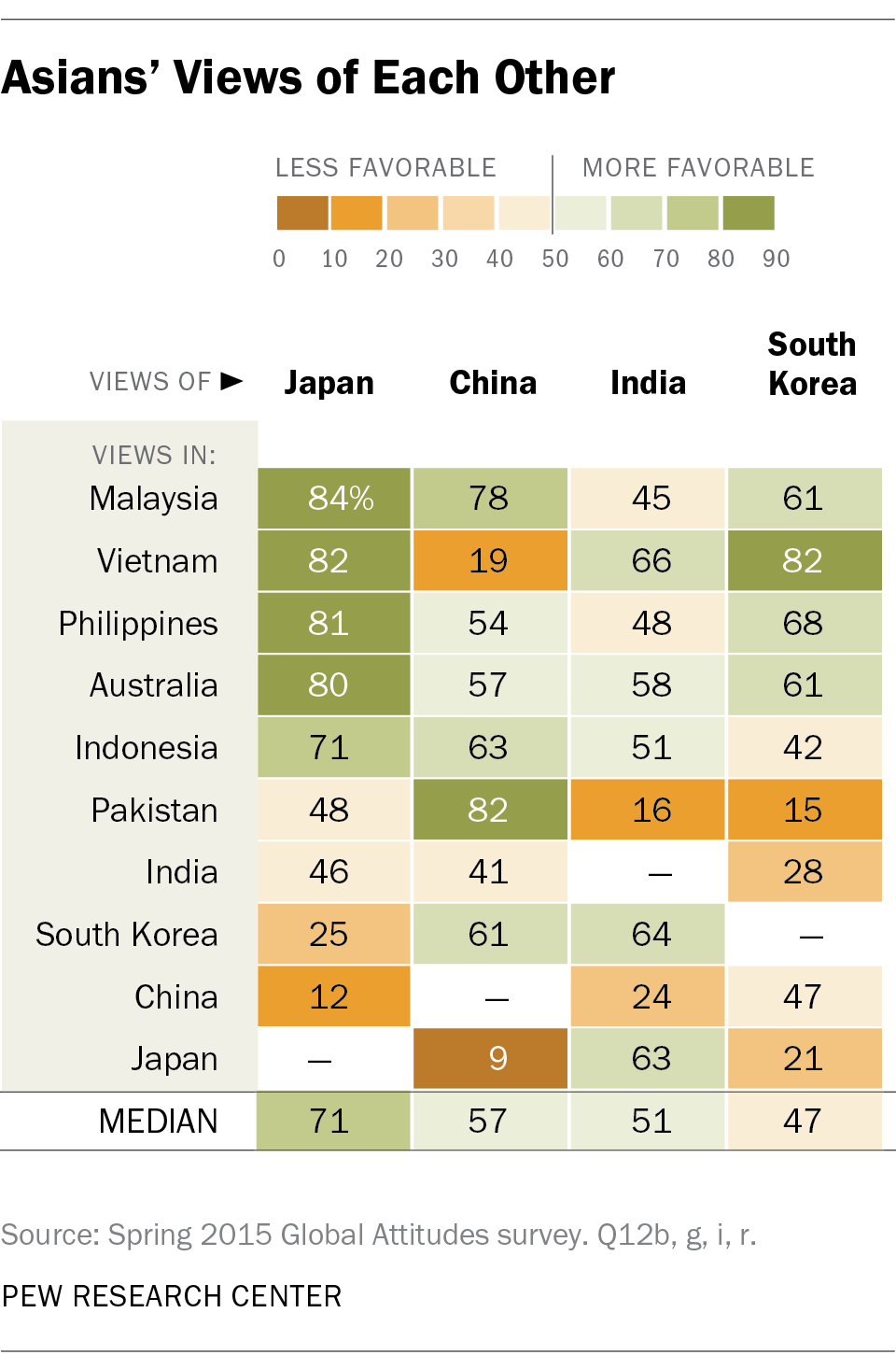
|
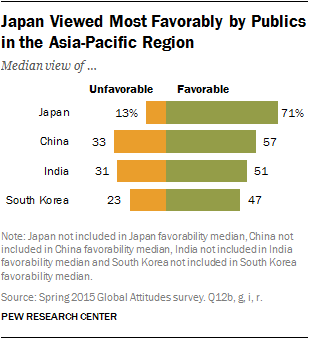

|
My Opinion
|
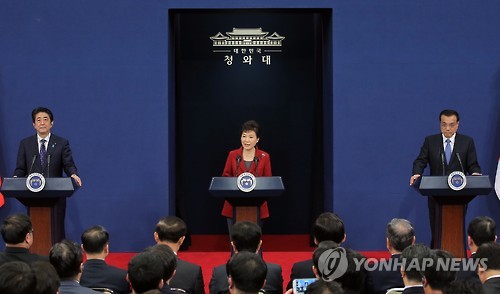
On November 8 South Korea's Ministry of Foreign Affairs announced the result of the questionary survey for 5,600 people of 14 countries including Japan, China, Indonesia, Philippines, Malaysia and United States. It became clear that Japanese have the strong tendency of "anti-Korea" & "anti-China" and the Chinese still have the tendency of "anti-Japan". Even if the summit of Japan, China and South Korea was held, national sentiments to the partner countries are not improved yet.
The national emotions of three countries are getting worse because of the confrontations around the history and the territory. The Korean diplomatic service explains that the suspicion for Korea is relatively weaker than the ditch of between China and Japan. It points out that Korea can play an important role in promoting a collaborative relationship in the East Asia. According to the survey, Japan's favorable rating is the highest in 12 countries except Japan and China.
Chinese news always say that "the sudden rise of China is welcomed in the world". But the people of 14 countries including Indonesia, the Philippines, Malaysia and the United States do not welcome China so much. |
My Opinion
|
| Freedom of the Press 2015 | Freedom on the Net 2015 |
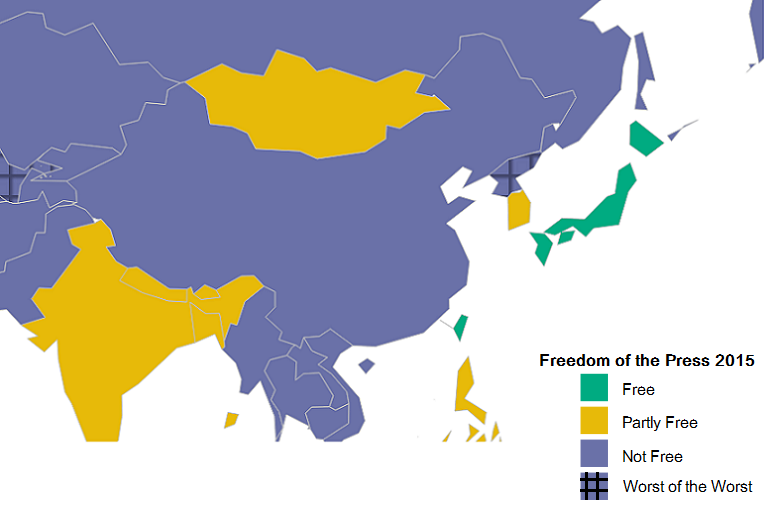
|
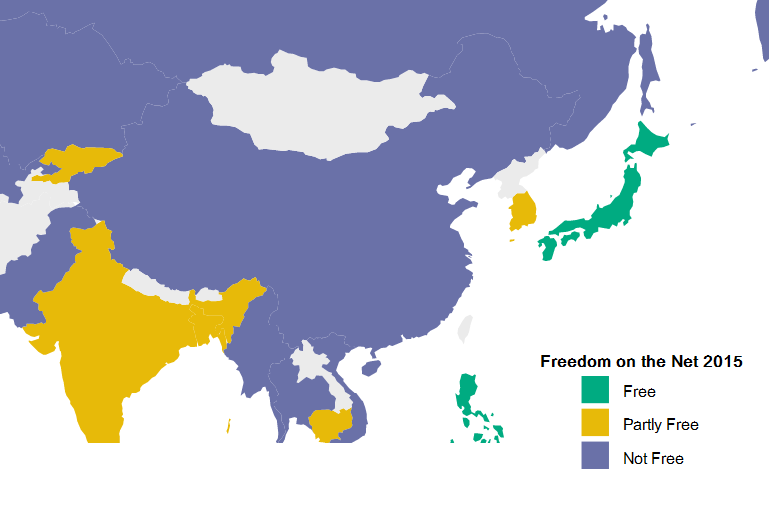
|
Freedom on the Net 2015 - COUNTRY SCORE COMPARISON

|
|
|
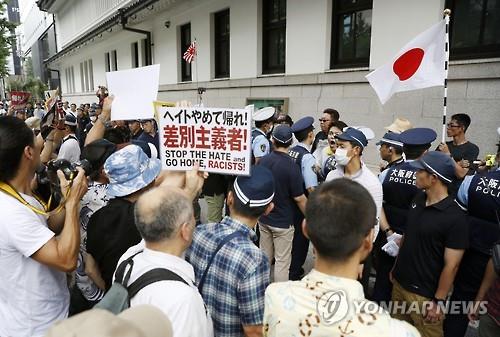
On July 17, a demonstration was performed near the Korean consulate general in Osaka. It made a demand for expulsion of the Korean residing in Japan and the diplomatic intercourse rupture between Japan and Korea. The oppositions gathered, too and protested the demonstration, and the outskirts were thrown into a commotion for a time. The person concerned of the citizen's group "active conservative movement" called people to "Big anti-Korea demonstration" on the Internet and carried it out. At about 3:00 p.m. on that day, approximately ten people shouted, "Break with the annoying neighbor" or "Go out, Korean" with the national flags and the sun flags and the loudspeakers in their hands. On the other hand, the members of the opposition roared with a loudspeaker, "Stop the hate speech" and "Go home the racist". Both groups booed each other in a loud voice on the sidewalk opposite of the consulate general for approximately one and a half hours, while dozens of police officers on the guard came between two groups. There was the scene that they struggled and was controlled by the police officers. The tourists and shoppers were embarrassed and left at a quick pace. It seems the opposition examines a legal action based on the regulations of the city. |
My Opinion
|

On July 5 Nafjay Panama of Niigata prefecture received arbitration over the trouble about the sales contract of the ferry from the Japan Shipping Exchange, Inc. (Tokyo) to pay approximately 1,570,000 dollars (approximately 157 million yen) to the Korean company. The loss are expected to exceed 230 million yen with 620,000 dollars paid in advance last year The trouble occurred because the ferry "Ohamana" that was assumed to be used in "Business across Sea of Japan", but the performance of the ferry was inferior to the supposed performance. The sales contract with the Korean company was made in the last August. However, it became clear that ferry had not a necessary speed of 18 knots when it made a cruise in Japan in October. It had a speed of only 11-12 knots. Nafjay Panama refused the receiving of the ferry, and the Korean company demanded payment. The Japanese company was able to prevent the trouble if it could confirm performance beforehand, but the president Igarashi explained saying "I demanded the examination cruise to the Korean company many times, but it was not realized". |
My opinion
|

A Burglar of Haworthia is caught
|
My opinion
|

Li Jun-gi, new Korean ambassador said to Japanese media, "It's better that we conclude Japan-Korea currency swap agreement again". On July 2 the ambassador said in the interview by the Nihon Keizai Shimbun, "Because nobody knows when and whom the crisis visits, the agreement will help two countries as crisis response". He also showed Korean will for participation in TPP (Pacific Partnership agreement) |
My opinion
|
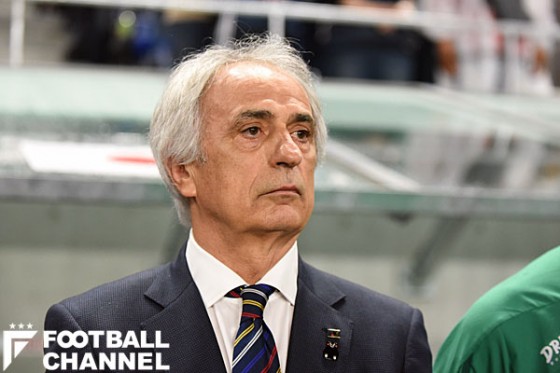
On June 7, the Japanese national team faced the national team of Bosnian and Herzegovina in the Kirin Cup finals. Japan lost by a reversal while taking an initiative point. Vahid Halilhodžić,the coach of Japanese National Soccer Team talked in the interview after the games, "I think we were not able to get ready well. It is my responsibility." He praised about the attacks to break the defense of the partner, "There were beautiful actions". However, the commander felt some questions. "I was very disappointed that our players were 'foolishly honest'". The partner had six players of the 190cm level, but every corner kick and FK became the scoring chance. Because we were inferior by height, we should have done what we could do such as letting our bodies adhere to the partners in order to prevent the partners from jumping. He also said, "We got no FK though we attacked so much. There was no play to provoke a foul in the vital area." "You may think that I say a funny thing, but it's not so. We did not have such a play. I think that our players are 'foolishly honest'. We must be more crafty." |
My Opinion
|
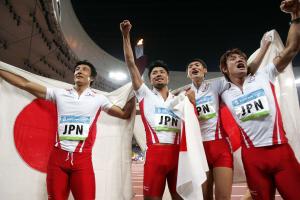
Jamaica's Usain Bolt could lose one of the three gold medals he won at the 2008 Beijing Olympics. Reuters report that the 'A' sample of one of his team-mates in the 4x100m, Nesta Carter, was found to contain the banned substance Methylhexanamine. The team took gold in what was then a new world record of 37.10 seconds, ahead of Trinidad and Tobago and Japan. Naoki Tsukahara who had been the first runner of Japanese team got angry and said, "To be honest, I am confused. When I heard the news, I thought what they would do about that. Though I am very glad if we get silver medal, we were not the second in eight teams. Gee, I am disappointed at the news." The coach Tsuchie said severely, too. "Even if we were said later we got silver medal, we would say 'Why?'. Japanese players fight in naivety well, while many countries commit the doping violations." When he was asked "Is the severe disposal to doping a fair wind for Japan?", he answered, "Apart from the fair wind or not, they are cheating. I wanted them to do it in the same starting line properly." |
My Opinion
|
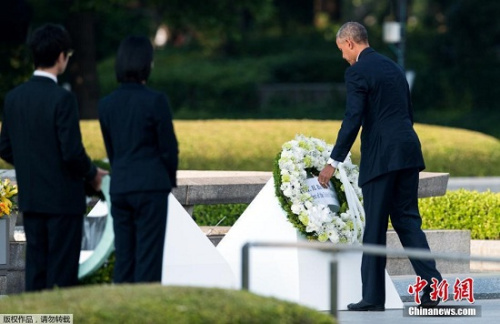
On June 27, President Obama visited Hiroshima, the bombed area. And he sued nuclear abolition with the speech for 17 minutes. It was whether President Obama would "apologize or not" for having thrown down the A-bombs that the Chinese media paid attention. If the United States that is the victorious nation apologizes to Japan that is the defeated nation, that may weaken the situation of Japan as "the assailant country", and that may impress people that Japan is "the damaged country". Obama's speech threw such a message that "Both an assailant and the victim must be forward looking each other". This is undesirable for China, because China may lose the Chinese diplomacy card which continues making Japan "a criminal of World War II" in future. So on May 27 Chinese Foreign Minister Wang gave a warning, "it was worthwhile that the victims are sympathized, but the assailant can not evade its responsibility forever". On the other hand, Sunao Tsuboi, the representative committee of Japan Confederation of A- and H-Bomb Sufferers Organizations said shaking hands with President Obama, "I do not blame the United States that dropped A-bombs". Chinese may take Japanese a vague people who shake hands without demanding apology. But you cannot turn up page 1 of the new history forever if not future-oriented. I feel irritated about why Chinese can not think of Hibakusha, A-bomb victims in Hiroshima who desires peace without apology. |
My Opinion
|
|
Tokyo delegation members celebrate after being confirmed Olympic hosts in 2013 French prosecutors are investigating a $2m (£1.4m) payment allegedly made to the son of the ex-world athletics chief and whether it was linked to Tokyo's bid for the 2020 Olympic Games. Allegations of the sum allegedly paid to a firm linked to the son of Lamine Diack had appeared in the Guardian. Both Lamine and his son, Papa Massata Diack, already face a corruption inquiry in France. The Japanese government has insisted its Tokyo bid in 2013 was clean. In March, French prosecutors had announced that an investigation into corruption in athletics was being widened to include the bidding and voting processes for the hosting of the 2016 and 2020 Olympics. Black Tidings The latest development involves 2.8m Singapore dollars allegedly paid to a company based in the city state and linked to Papa Massata Diack. A statement said the French "National Financial Prosecution service was informed of two financial movements alleged to have been carried out in July and October 2013". The money was labelled as 'Tokyo 2020 Olympic Games Bid', coming from an account opened at a Japanese bank, for the profit of the 'Black Tidings' company in Singapore. The statement added that payments "so close to the International Olympic Committee's designation of the organising city for the 2020 Olympic Games, important parallel purchases by Black Tidings in Paris", and other related issues had sparked a new inquiry. Lamine Diack, 82, was formerly the president of the International Association of Athletics Federations (IAAF) and also a member of the International Olympic Committee (IOC). He left the IOC soon after voting, in 2013, on whether Tokyo, Istanbul or Madrid should host the 2020 games. He is now banned from leaving France pending the investigations. Papa Massata Diack is believed to be in Senegal. Last December, he told the BBC he and his father were innocent of the allegations against them. Tokyo bid already being looked at The Tokyo bid first came under scrutiny in January when the second part of a Wada (World Anti-Doping Agency) commission report into corruption included a footnote detailing a conversation between another of Lamine Diack's sons, Khalil, and Turkish officials heading up the Istanbul bid team. A transcript of the conversation cited in the report suggested a "sponsorship" payment of between $4m and $5m (£2.8m and £3.4m) had been made by the Japanese bid team "either to the Diamond League (the annual series of track and field athletics meetings) or IAAF". The footnote claims the Istanbul bid "lost Lamine Diack's support because they did not pay". Wada's independent commission said it did not investigate the claims "for it was not within our remit". A Tokyo 2020 spokeswoman described the note in Wada's report as "beyond our understanding", adding that "Tokyo's bid was about Japan's commitment to address issues around the integrity of sport". What is the background? Lamine Diack is already being investigated by French authorities. He was arrested last year on corruption and money laundering charges, over allegations he took payments for deferring sanctions against Russian drugs cheats. His son Papa Massata, who was employed by his father as a marketing consultant for the IAAF, is also under investigation, and a warrant for his arrest has been issued by Interpol. Diack Jr has been banned for life by the IAAF. The IOC overhauled its rules - and regained trust in the integrity of its bidding process - since the 1999 Salt Lake City bribery scandal exposed systematic corruption. In February, Wada commission chief Dick Pound said he was "fairly certain" the IOC was free of organised corruption, but just a month later the French prosecutors opened their investigation into the bidding processes for 2016 and 2020. |
My Opinion
|
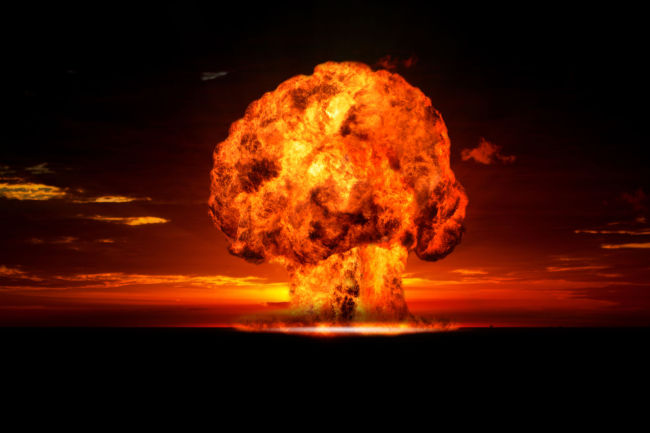
While some U. S. media show anxiety that "many Japanese would interpret it as 'apology'" about President Obama's visiting Hiroshima, Koreans who were damaged by A-bomb throwing down to Japan in 1945 demand apology and compensation to the United States. On the same day, Mr. Sung, the chairperson of association of Korean A-bomb victims said, "We will hold the board of directors and talk about the situation of the church to require to President Obama. We are planning to demand the compensation to him in addition to offering flowers to the Korean memorial service monument at Hiroshima Park and apologizing to Koreans." |
My Opinion
|
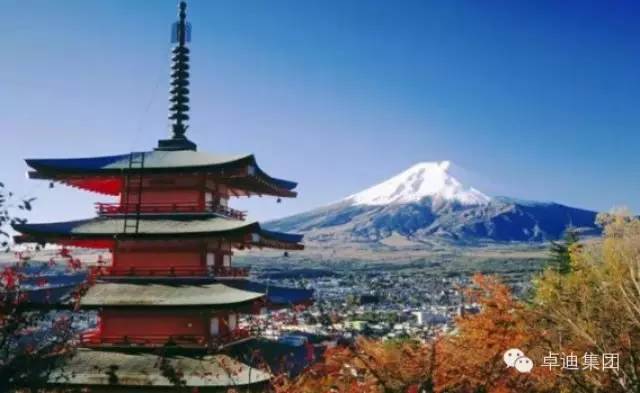
The first : "social order supported by sincerity and trust."
The second : "food safety supported by sincerity and trust."
The third : "the resident registration system supported by sincerity and trust."
The fourth : "sincerity and trust are the creed of the life"
|
My Opinion
|

France leads the world in the field of fashion, and many foreign students come from all over the world to learn French fashion. Experiences of a Chinese columnist resident in France: At a school connected with fashion in Paris, both the most superior teacher and students are Japanese. About the foreign students who just begin studying in France, in the first year the big differences are not seen in nationality. But in the second year the level of the Japanese students are suddenly improved. Most of the Japanese students throw themselves into studying seriously and the students of other countries cannot imitate that. French teachers estimate that "Japanese students are quiet, well-behaved and polite, and they don't cheat on the examination". On the other hand, the Chinese students are not often well-mannered. The Chinese sometimes shows the "non-civilization" manner. Some Chinese students open their big mouths in their classes and yawn. The Chinese students do not get the high evaluation in France. You must not forget that you have a signboard "China" on your back in the foreign countries. |
My Opinion
|
|
Li Miao, the chief of Tokyo branch of phoenix TV reported Kumamoto earthquake. She has been living in Japan for 19 years. She appeared in a TV program of Japanese NHK and entered the phoenix TV in 2007. The earthquake victims received a relief supply forming a line and keeping order in spite of only one rice ball. How difficult is it to continue keeping order under the situation that they suffer from? Japanese people don't quarrel or bawl out under the situation that aftershocks continue without cease, uneasiness influences people and they cannot receive relief materials enough. Japanese people can create order and keep tranquility even under the very severe situation. The restroom of the refuge is used very cleanly, and the slippers of the restroom are put properly. I was astonished in well-ordered Japanese. Furthermore, even in the middle of the disaster, classification of the garbage is carried out well.
|
My Opinion
|
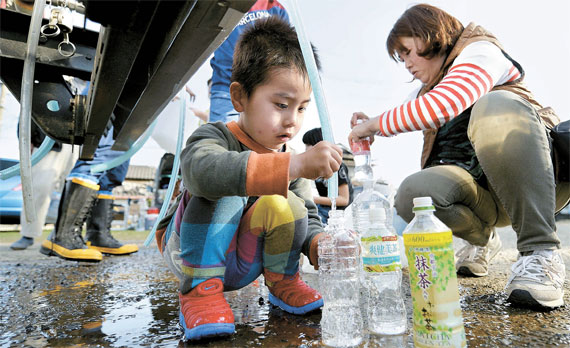
|
My Opinion
|
Public opinion poll about diplomacy in 2014 (Japanese Cabinet Office) 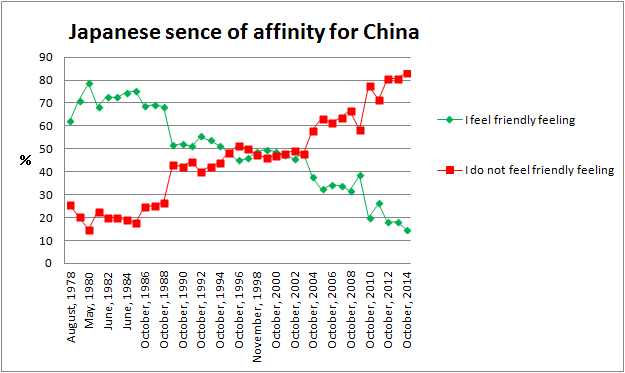
The aggravation of Japanese feelings for China lasts after 2012. The artificial island creation by China in the South China Sea and the confrontation by China and Japan about Senkaku Islands are in the background. |
My Opinion
|
|
The PR event that Japanese Ministry of Foreign Affairs was going to hold in commercial facilities in Wangsimni Station in Seoul in Korea on February 20th and 21st to wipe out the damage by rumors by the East Japan great earthquake disaster was called off. Japanese Ministry of Foreign Affairs to sponsor announced it on February 20th. Seoul City Song-dong-gu did not permit the event. A citizen group in Korea had claimed, "Cancel the event of the radioactive contamination foods in Fukushima promptly!". Seoul City Song-dong-gu might have considered such a repulsion. |
My Opinion
|

After the fourth nuclear test in North Korea, the reckless nuclear armament idea is a subject of a heated debate in the conservative in South Korea. But Japan is quiet unlike Korea. Japan does not give a special reaction to the nuclear armament in Korea either. Why? In 2006 and 2009 when North Korea had the nuclear tests, Shoichi Nakagawa (died in 2009) who was a former Japanese Diet member and a member of Liberal Democratic Party woke an argument. He said, "Only nuclear weapon stands up to nuclear weapon." However, the current Abe Administration keeps silent. Japan is considered to have ability that can make a nuclear weapon within from six months to one year if determined. Some Korean say, because Japanese ability is enough, Japan has not to wake up an uproar by useless words, and this is the highly well-thought reaction. |
My Opinion
|

Japan Airlines (JAL) is the world’s best airline for its on-time performance service, according to FlightStats Inc., an independent aviation performance-tracking company, which today presented JAL with its Major International Airlines On-time Performance Service Award for 2015. JAL achieved on-time arrival rate of 89.44% for its domestic and international flights in 2015, and has been ranked highest for on-time performance service in the Major International Airlines category for the fifth times, since FlightStats launched these awards in 2009. Additionally, JAL has been named the most on-time carrier in the Asia-Pacific Major Airlines category. |
My Opinion
|
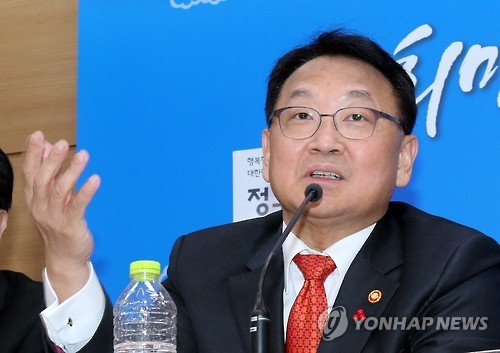
On January 14, Yu Ilho Korean deputy prime minister said, "We are not in the situation that must propel a Japan-Korea currency swap agreement right now." And he also said, "We do not oppose the swap agreement if Japan offers that to us." This is the reaction to Japanese report that Japanese Sankei Shimbun said "if the Korean government offers the currency swap agreement formally, Japanese Government is going to agree to it again". The agreement means that a country with the economic power supports neighbor countries. Hirokazu Hiratsuka, director of Asia Research Department of the Mizuho Research Institute says, "From a viewpoint of the confidence of currency and foreign exchange reserves, Japanese yen has the high convertibility than Korean won, and the situation is that Japan supports Korea and Korea is supported." |
My Opinion
|

My French friend who likes culture of China and Japan said, "When I see a Asian walking a downtown in Paris, I can distinguish between Chinese and Japanese even if the Asian is speaking nothing". I was very embarrassed and ashamed to hear the reason. He says there are three ways. At first, The difference in the clothes and the looking. The Japanese do the elegant manner. On the contrary, the Chinese wear slovenly even if they wear the suits. The Japanese dress even the clothes of the non-brand well cleanly, and mind the hairstyle too. The Chinese like wearing the suits, but their posture is slovenly and they are unconcerned about hairstyle and appearance. Second Japanese is polite and have humility and talk in a low voice. The Chinese sit down and relax anywhere, vomit a sputum on the way, and speak like thunder sounds. The Japanese give way to each other in the streets and have perseverance patiently waiting a red light. The Chinese lack in the concept called mutual concessions and walk to compete. When Chinese are tired, they lie down anywhere, take off a tie, roll up the hem of pants, occupy the passage and talk loudly. They behave to selfishness as if only they existed in the world. Third the Japanese appreciate art slowly and carefully at a famous place and respect cultural environment. The Chinese leave quickly after they finish taking a photograph without minding artistic quality. The Japanese understand appreciation of the art. But only visiting is important for Chinese and they are not interested in artistic value. Conclusion:"The lifestyle" is related to not only personal conduct and personality, but also the human race and the national image. In particular, the good custom of one person raises the reputation of the nation and the human race of the person. The bad custom of one person sometimes injure the reputation of that. |
My Opinion
|
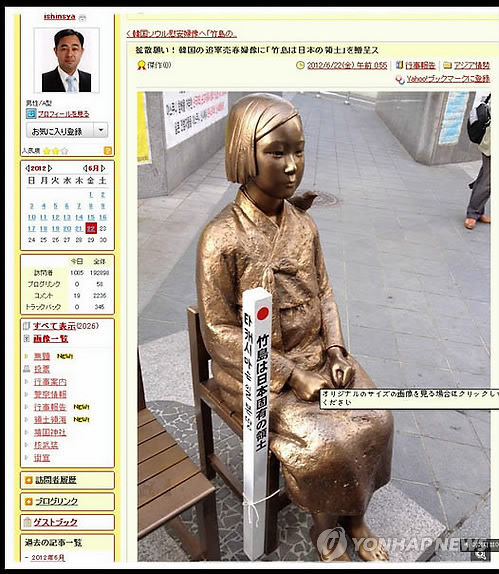
The trial of Japanese extreme right Nobuyuki Suzuki indicted without arrest in February, 2013 has been performed for three years. This is because Suzuki does not accept a judicial summons in Korea. He nailed the stake that wrote "Takeshima (Tok-do) is a territory of Japan" beside the statue of comfort woman in front of the Japanese Embassy in Korea. The Seoul central district court holds the seventh trial of Suzuki on January 15. This trial is held for the first time in 1 and half year after the sixth trial of June 30, 2014. However, Korea cannot punish him through a trial even if Korea repeats to say many times that he does wild remarks and barbaric acts unless he sets foot on the Korean ground because Japanese Government is uncooperative. He sent a statue of girl to insult a comfort women victims and a stake that wrote "Takeshima is Japanese territory" written in Japanese to "House of Sharing" and "Korean Council for comfort women" on May 19, last year. He is also suspected of setting the stake that wrote "Takeshima is a territory of Japan" beside "Ardent patriotism monument of Loyal retainer Yun Bong-gil" in Japan, and having insulted Yoon righteous person with "terrorist" in September, 2012. He ran for the Upper House election of Japan in 2013, but lost. ※Yun Bong-gil … He set off a bomb that killed several Japanese dignitaries and injured many people in Shanghai in 1932. |
My Opinion
|
| Korean | Japanese |
|
The Korean government accepts the setting of the statue of comfort woman in front of Japanese Embassy in Korea even if it violates Vienna Convention on Diplomatic Relations Article 22-2.
(The article says "The receiving State is under a special duty to take all appropriate steps to protect the premises of the mission against any intrusion or damage and to prevent any disturbance of the peace of the mission or impairment of its dignity.") | The Japanese does nothing in front of the Korean embassy in Japan. |
| Korean who picked a bomb with a shrine in Japan is a hero and is respected in Korea. | The Japanese who nailed a stake beside statue of comfort women is looked down on. |
| Korean emotionally labels all the thing against their opinion as "irresponsible remark". | Japanese tries to argue the thing unlike their opinion logically. |
| Korean sues anything against their opinion for libel and an insult. | Japanese respects freedom of expression, and treats the libel carefully. |
| Korean who did terrorism for the Japanese is a hero and is respected. | The terrorist is looked down on. |
| There cannot be the Japanese monument in Korea. | Japanese permits the Korean monument of the Korean terrorist in Japan. |
| On July 9, 2012, the light truck which a Korean man drove broke into the Japanese Embassy in Korea. | The Japanese truck does not break into the Korean embassy in Japan. |

In Taiwan where an epidemic was ungoverned in those days, the rule by Japan restrained epidemics such as malaria or cholera and improved the public hygiene. Japan solved the problems in only approximately ten years. It was impossible for the Qing dynasty to solve them. In addition, the Japanese police protected law strictly and did administration without the corruption to maintain the peace and order. It was also impossible for the Qing dynasty to do so. Furthermore, Japan performed "agriculture reform" in Taiwan. Specifically, they are selective breeding, fertilization, mothproofing, the setting of irrigation facilities and the work system which were consistent from production to processing. As a result of this full-scale agriculture reform, the Taiwanese people obtained a big profit. Taito in the Japanese colonial days |
My Opinion
|

TOKYO ? Japan and South Korea said Monday they had “finally and irreversibly” resolved a dispute over wartime sex slaves that has bedeviled relations between the two countries for decades. In something of a surprise development, the two countries’ foreign ministers met in Seoul to finalize a deal that will see Japan put $8.3 million into a South Korean fund to support the 46 surviving “comfort women” and to help them recover their “honor and dignity” and heal their “psychological wounds.” The move was welcomed in Washington, which has been both concerned and annoyed by the fighting between its two closest allies in Asia. This year marks seven decades since the end of World War II and the end of the Japanese occupation of the Korean peninsula. Independent historians have concluded that as many as 200,000 women and girls ? from occupied countries including Korea, China, the Philippines and other Southeast Asian nations ? were coerced by the Japanese Imperial Army to work as sex slaves during the war. “We made a final and irreversible solution at this 70th anniversary milestone,” Japanese prime minister Shinzo Abe told reporters in Tokyo after speaking to his South Korean counterpart, President Park Geun-hye, on the phone. Earlier, in Seoul, his foreign minister had said Abe “expresses anew his most sincere apologies and remorse to all the women who underwent immeasurable and painful experiences.” “I feel we’ve fulfilled the responsibility of the generation living now,” Abe said after his call with Park. “I’d like this to be a trigger for Japan and South Korea to cooperate and open a new era.” In Seoul, Park said it was “especially meaningful” to reach the agreement before the end of 2015, the 50th anniversary of normalized relations between Japan and South Korea. “The most important thing is for Japan to diligently and promptly implement what has been agreed to restore comfort women victims’ honor and dignity and heal their wounded hearts,” Park said, according to the Yonhap News Agency, after meeting with Fumio Kishida, Japan’s foreign minister. Seoul nonetheless promised this would be the end of the dispute ? which has been officially “resolved” before ? if Japan fulfills its side of the agreement. It comes less than two months after the two leaders held their first summit , and after the resolution of a high-profile court case, with a Japanese journalist this month acquitted of defaming Park. Tokyo had considered the dispute to have been formally resolved in 1965, when it normalized relations with South Korea and offered $800 million in compensation in 1965 for its colonial-era brutality. |
My Opinion
|
 Patrick in Gamba Osaka【photograph::Getty Images】
Patrick in Gamba Osaka【photograph::Getty Images】
It became clear that the student who went to the high school in Saitama wrote a discriminatory remark on SNS against FW Patrick in Gamba Osaka. According to the release of the apology that the school placed on the homepage, the student who wrote the discriminatory remark reported that to the school with his protector.
The school said, "We sincerely apologize to Patrick and his family, members of Gamba Osaka and Urawa red diamond, members of J League and all who felt unpleasant by the note to Twitter.
And we will guide students to prevent the recurrence.
|
My Opinion
|

It was revealed that when the International Atomic Energy Agency (IAEA) had inspected Korean confidential uranium enrichment experiment facilities in the summer of 2004, IAEA had confiscated the documents about the patent of the enrichment technology that Japan had developed. Olli Heinonen who was the former Deputy Director-General and acted as the person in charge of the nuclear verification section in IAEA clarified that. The instruments based on this patent was found by the inspection too. In major Western countries, information disclosure of the technique to lead to nuclear weapon development is limited, but, in Japan, detailed technical information is shown by patent application. It was revealed that the nuclear technique that could be converted into military affairs was used in other countries by deficiency of the Japanese patent system for the first time. According to Heinonen, when IAEA inspected "Korean Atomic Energy Research Institute" in Daejeon of the central part of Korea, they found the Japanese enrichment technology information. It was the documents about the patents of the techniques called "the laser enrichment method" that was developed by "the laser enrichment technology research association" established by the Japanese electricity companies in 1987. In addition, IAEA confirmed the core instruments of this patent by the inspection. When a country performs an experiment to use the nuclear material including uranium, it is necessary to tell IAEA beforehand, but Korea neglected this and reported it in August, 2004. The confidential experiment was clarified by the inspection of IAEA. |
My Opinion
|
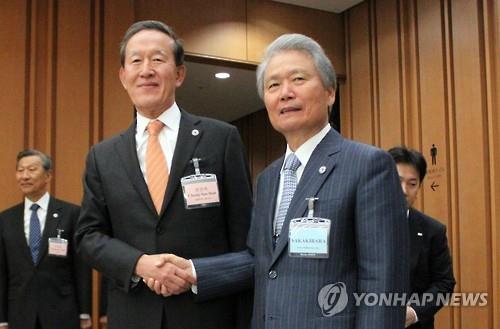
On October 26, the regular meeting of Japan Business Federation (Keidanren) and Korean businessmen society was held. The economic world of two countries agreed to cooperate for the improvement of the politics and diplomatic relations between two countries. And they agreed to promote the economic cooperation plans such as young people-to-people exchange, the re-conclusion of central bank liquidity swap, etc.. 【Commentary】 The Korean newspapers wrote both sides hoped for the re-conclusion of the agreement. But actually Korean Chairperson demanded the re-conclusion of the agreement that had been finished in this February. There is a Korean sense of impending crisis to suffer the slump of the growth rate in the background. The Korean economy receives a big blow, because the export competitiveness is declining by the strong Won and the Korea economy depends on the export for China. Japan and Korea concluded a swap agreement in 2001. They enlarged the flexibility frames to 70 billion dollars in response to the debt crisis in Europe in 2011. However, they reduced to 13 billion dollars in 2014. In 2015, Korean side said they did not need the extension, and the swap agreement was finished in this February. Korea has a profit in the agreement, but Japanese side has no profit in it. That is, it is to help Korea. |
My Opinion
|
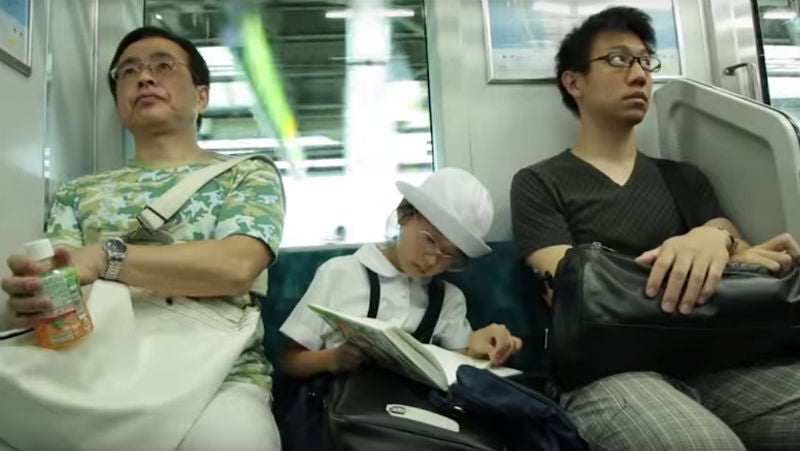
Japanese kids can run errands around town and take public transportation free of supervision. It's thanks to the country's incredible infrastructure and culture of safety. Broadly speaking, in Japan, folks generally assume they can depend on others. (Japan's rock bottom crime rates back this up. ) This mindset infiltrates so many aspects of Japanese life, with its infrastructure as one of the best examples. It's one of the reasons kids as young as six navigate the human-filled labyrinth of Tokyo solo. The trains are spotless, on time, and safe. A respect for others and an attention to detail give Japan's public transportation the best customer service on Earth. Engineering is concerned with the greater good: Japan's world-famous bullet train, for example, sees an average delay of 36 seconds. Plus, it's so safe that zero people were killed or injured while 27 trains were in operation during the 2011 earthquake. Part of why Japanese parents let their kids go it alone is a desire to instill a sense of responsibility, but it's also because the country is run in such a way that it makes parents feel comfortable enough to do so. Of course, the full reason why little kids can bop around alone in Japan is incredibly complex, with tons of cultural forces that can be explained and examined. But Japan's remarkably maintained infrastructure is a big part of it. Public transportation has been made a top priority in the densely packed archipelago—something many other countries could learn from. |

When Japanese talk about the peace and order of Japan, they boast and say "We do not close the entrance at night. We do not pocket a lost article which we picked up on a road". Generally speaking, even if you drop and lose something in Japan, they do not carry it away and steal it. Most of Japanese are not interested in a lost article of other persons, and far from stealing it, they send it to a police box or the lost article checkroom directly. A reporter of "Life Times" in China wrote that. One day in 2005, the reporter dropped a wallet carelessly at an Immigration Bureau in Japan. He noticed on the way home and he came back to the Bureau, but he could not find it. However, in the next day he received the news that his wallet was found from the police box. According to the police officer, a man found it at the Bureau on the day before, and brought it to the police box. When he checked the wallet, nothing was changed in it at all. He asked the police officer the phone number of the person of conscience and expressed his thanks on the telephone. He told the person that he wanted to hand the reward, but the person declined it rigidly. According to the Japanese "Lost Goods Law", the lost article is kept in the police for three months. When the owner does not appear for 3 months, it belongs to the person who picked it up, but it is necessary for the police to show the information of the lost article online. If you make the lost article yours without bringing it to the police, you will be punished by imprisonment with work for not more than 1 year or a fine of not more than 100, 000 yen. If the lost article returns to the owner, the owner has to hand a reward to the person who picked it up. The Japanese children receive moral education at the kindergarten. The teachers tell them emphatically and repeatedly, "You must not take the thing which is not yours. You must bring anything that you pick up to a police box without making it yours." In addition, the Japanese think about the money that you can't know the owner with "very dangerous thing" or "things inviting the evil". The Japanese have such a consciousness about a lost article of another person and bring it to the lost article checkroom or the police box without pocketing it. |
My Opinion
|

It has been pointed out that the formal emblem of the Tokyo Olympic Games in 2020 resembles the logo of the Belgian theater. The Tokyo Olympic Organizing Committee held the adjustment meeting to make with the affiliates top of the Olympic Games on the afternoon of September 1. It formally decided to cancel the use of the emblem Mr. Kenjiro Sano (43) had designed.
In the interview held after the meeting, Secretary-General Toshiro Muto explained about emblem use cancellation decision and said,
He talked about the opinion of the design examination committee,
"We had a proposal from Sano. He said, 'I want to withdraw my suggestion because it is not accepted by people now and it will be a bad influence on the Tokyo Olympic Games'. In response to the proposal, we talked with the design examination committee and decided to cancel the use of the emblem." The problems over the design of Sano announced on July 24 appeared one after another. Olivier Debie who is the designer of the Belgian theater logo filed a suit to prohibit the use of the emblem, the photographs of the utilization examples of the emblem which Sano submitted were converted into from the individual sites in the Internet and the original design of Sano resembles a part of the poster of a exhibition, etc.. |
My Opinion
|
|
TheJapanChannelDcom |
My Opinion
|

|
My Opinion
|

|
My opinion
|
|
Korean Mayor of Seoul Park visited Japan and Tokyo and Seoul City concluded the statement of "mutual agreement of the technical cooperation about road cave-in" on February 2nd.
The contents are that both sides give a technique for the security of the city each other. Tokyo held out a helping hand to the Seoul city where a road cave-in became the social problem. The check and repair technology of road in Japan advances in comparison with Korea more than 20 years. Mutual cooperation may become nominal and it will become the "one way" support by Tokyo.

|
My Opinion
|
|
My opinion
|
|
||||||
My opinion
|
|
|
My opinion
|
|
My opinion
|
|
My Opinion
|
|
|
|
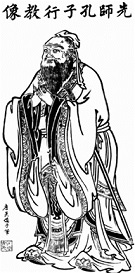
|
My Opinion
|
|
My Opinion
|